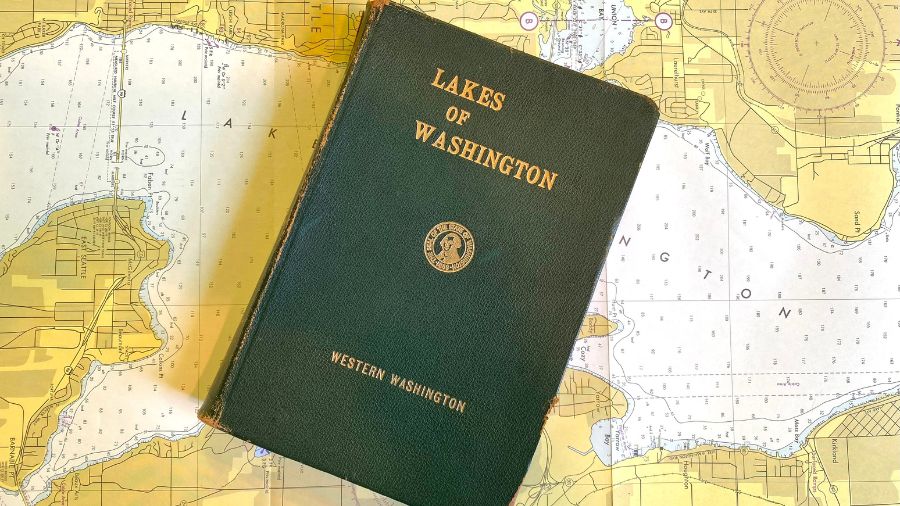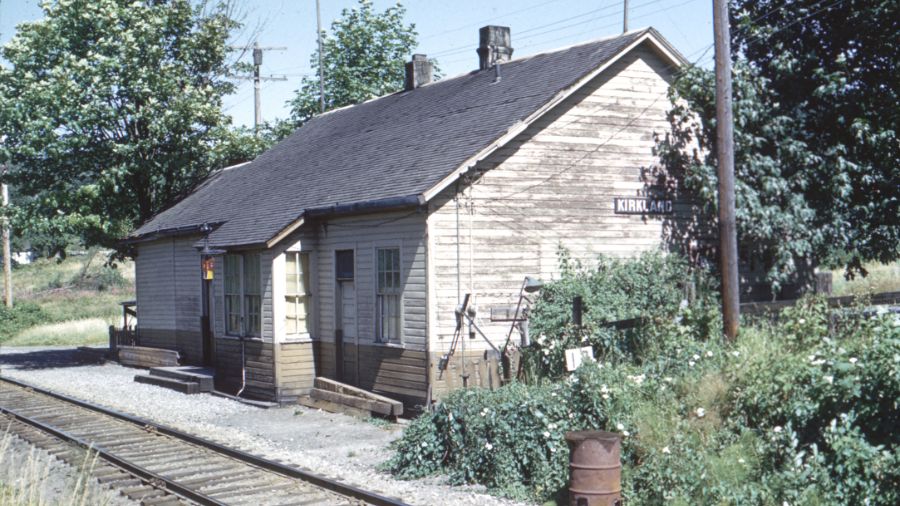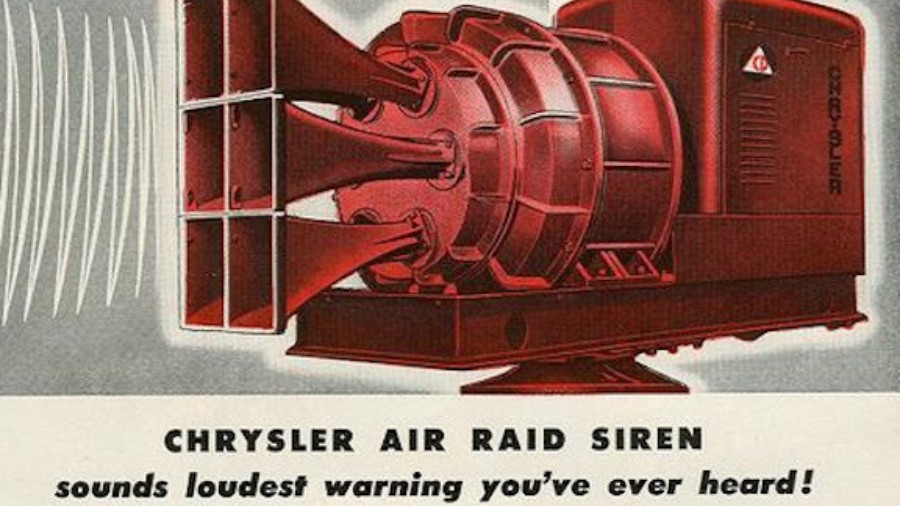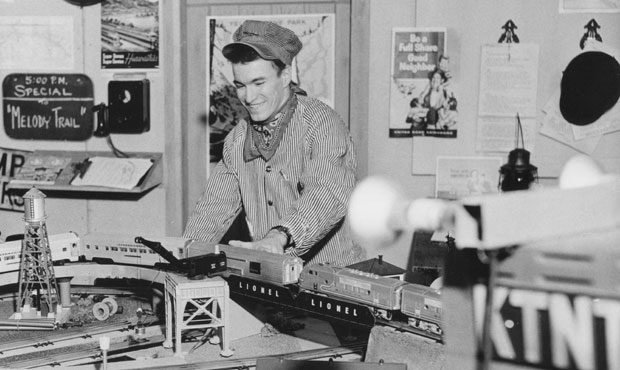Family seeks Hall of Fame honor for long-ago UW football hero
Jan 12, 2022, 8:35 AM | Updated: 1:21 pm
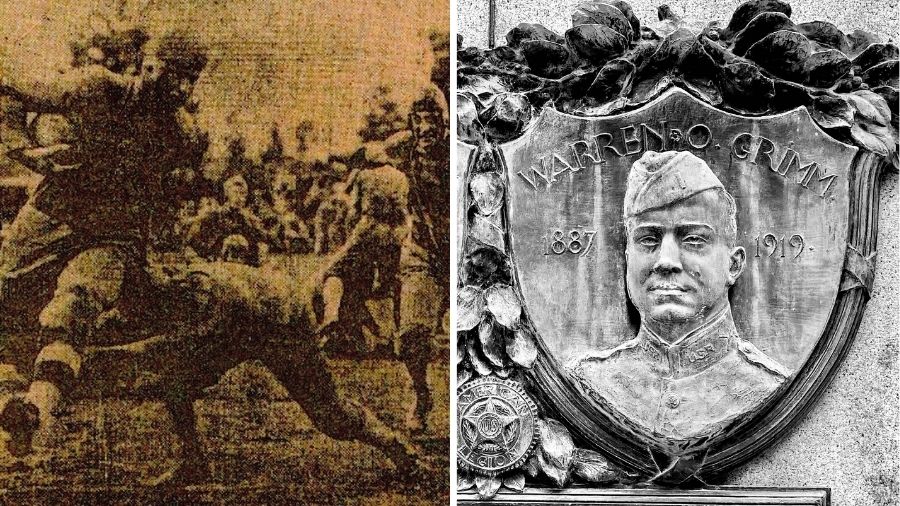
Brothers Huber "Polly" Grimm (L), pictured here carrying the ball, and Warren "Wedge" Grimm played for the University of Washington more than 100 years ago; Polly's grandson believes he belongs in the Husky Hall of Fame. (Public domain; Feliks Banel/KIRO Radio)
(Public domain; Feliks Banel/KIRO Radio)
Coach Don James, Sonny Sixkiller, the “Boys in the Boat” – those are just some of the sports figures in the Husky Hall of Fame at the University of Washington.
But one standout All-American figure from the football team’s early days is missing.
More than a century after Huber “Polly” Grimm hung up his cleats for the last time, his grandson is working to change that. But he’s not having much luck.
Scott Grimm is in his early 60s and lives in Seattle. His grandfather is one of three Grimm brothers from Centralia. By all accounts, they were tough and smart guys who played football for Washington beginning back in 1907 – when Teddy Roosevelt was president, and before the team was even called the Huskies. These were also the years when Gil Dobie was the legendary UW coach, masterminding the team’s incredible 40-game winning streak.
To hear Scott Grimm tell it, two of the Grimm Brothers – his great uncles Bill Grimm and Warren Grimm – were decent football players. But Scott’s grandfather – Huber “Polly” Grimm, was a great football player, and a multi-sport athlete, too. As a tackle for the football team, Polly Grimm was Washington’s first All-American, the first All-American west of the Mississippi, and something of a real standout more than 110 years ago.
And that’s part of the problem, says Scott Grimm, since the Hall of Fame was only created in 1979.
“I think he’s just a faint memory in the minds of football aficionados of the University of Washington,” Scott Grimm said. “He belongs in the Hall of Fame, clearly, based on all of his exploits in other sports as well. Being the U.S. wrestling champion in 1911, and also being a baseball player for the University of Washington, to a ‘trackster.’ And he also wrestled for the University of Washington as a club sport.”
After his college career, Polly Grimm was a pro wrestler in the years before World War I, when pro wrestling was more purely about wresting and not yet a dramatic art, says his grandson. He’d also made the most of academic opportunities during his years at the UW, where he earned a law degree. The former football standout spent 30 years as a judge in back in his hometown of Centralia, where he raised a family, and where he passed away in the late 1950s.
But how, exactly, does a guy named “Huber” wind up getting called “Polly?”
“When he was a child, he was in a play and he was Polyphemus, the Cyclops, the one-eyed cyclops,” Scott Grimm said. “And they nicknamed him ‘Polly’ and it stuck, and he had that name all his life.”
Polly belongs in the Husky Hall of Fame, says Scott Grimm, and it’s long overdue.
But it takes more than a family member wanting to honor an ancestor in order to get in to the elite club.
The Husky Hall of Fame is managed by a sports booster group at the UW known as the Tyee Club. Lists of inductees are posted online, and there’s a display of plaques and photos in the lobby area of Hec Ed Pavilion.
Scott Grimm says he and his family know that display well, and that they have been dyed-in-the-purple-and-gold-wool Husky fans for decades. The family has been Husky football ticketholders since the 1940s, and they have been boating to games since 1954, “before there was a dock,” Scott Grimm says. This past year, he made a second attempt to get his grandfather in the Hall of Fame.
The Grimm family submitted the nomination packet last May. And then?
“It was crickets. Crickets. Not a word,” Scott Grimm said. “We didn’t even get a ‘thank you for your application.’ I have confirmed that it was there. I had a nice conversation with the administrative assistant, but then never heard anything, until all of a sudden I saw on Twitter the announcement of those people.”
Those people inducted at Husky Homecoming last October include football players Marques Tuiasosopo and Jake Locker, tennis player Claire Carter, softball player Kristen Rivera, and “The Five Who Dared” — four Black players and a coach who led a protest against racial discrimination back in 1969.
The staff member who oversees the Hall of Fame and the nomination process is Jeff Bechthold, assistant athletic director for athletic communications for the University of Washington.
“We got a lot of nominations last time,” Bechthold said. “I think of something like 50 — only eight got in.”
The nomination process, which Bechthold says used to be an annual program, has recently been held only every other year.
Bechthold is not sure why Scott Grimm didn’t get notified, but he says it might have been because there were so many nominations. Bechthold also told KIRO Radio that, like other sports honors, this Husky version is conducted by a committee of staff, former staff, and community members, who are very selective about who gets inducted.
“I would say this, you know, to be respectful as possible,” Bechthold said. “There are a lot of people who could have a very good argument that they belong in this Hall of Fame or that Hall of Fame — those arguments exist about the pro football Hall of Fame, Baseball Hall of Fame, you name it.”
“It’s a very, very high bar, I would say,” Bechthold continued. “Also, … in the early years, most of the early history of Husky sports was put into the Hall of Fame. The people from the 1900s through the 1930s or so were almost exclusively put in in those first eight to 10 classes of the Husky Hall of Fame back in the 70s and into the 80s.”
“Teammates of Polly’s like [quarterback] “Wee” Willie Coyle and his coach [Gil Dobie] were both in the first two classes,” Bechthold said.
Bechthold says he can’t remember specifically why Polly Grimm wasn’t chosen, and he says there are no formal criteria for induction.
“It can’t be rigid because there’s just too many variables,” Bechthold said.
Think of “an All-American shot-putter from 1920 [and] comparing him to a women’s soccer player from 2010,” Bechthold said. “It’s just hard to say how you can compare those two things.”
What about the next cycle? If Scott Grimm continues reaching out and educating current Husky fans about his grandfather, might the next selection committee be more inclined to induct Polly Grimm when they next review nominations in early 2023?
“We’ve kind of covered the early portion of the history of UW athletics through those first 10 or so classes, and we have a lot of deserving people that deserve to get in,” Bechthold said. “And it’s very, very difficult. It’s hard to tell people ‘no,’ but you know, that’s the nature of this kind of thing.”
Local sports historian David Eskenazi knows of Polly Grimm, and he says it’s no stretch to think of him as Husky Hall of Fame material.
“Anyone who was a captain on Gil Dobie’s team is worthy of consideration,” Eskenazi told KIRO Radio on Tuesday.
Meanwhile, Scott Grimm and his family aren’t ready to give up just yet. In a text message early Wednesday after the broadcast version of this story aired, Scott Grimm wrote, “I would love to head up a veteran’s committee to research and recognize athletes who were overlooked. Just like Major League Baseball does for its Hall of Fame. It would be a separate category.”
Why go to so much trouble to honor a man whose athletic exploits took place more than a century ago, and who was clearly appreciated and beloved by his family?
“It means the world to us, because what it does is it recognizes an accomplishment by a very accomplished man,” Scott Grimm said. “He helped put the University of Washington on the map. People deserve to hear and understand what he did. … [It’s] just as much as any of the modern-day athletes have helped the University of Washington.”
There’s one more fascinating aspect of the history of the Grimm brothers that’s worth mentioning and worth remembering, perhaps even more than any football game or wrestling match this year, or a hundred years ago.
Polly Grimm’s younger brother, who also played football for Washington and also earned a law degree at the UW, was Warren “Wedge” Grimm. After graduation, he worked for the King County Assessor’s Office, and then enlisted in the U.S. Army and fought overseas during World War I.
When he returned after the Armistice, Warren Grimm came back to Centralia, and became a leader of the local American Legion post. In this role, Warren Grimm was caught up in one of the darkest moments in the Evergreen State – on the first anniversary of the Armistice, Nov. 11, 1919.
Trouble had been brewing for years in the Pacific Northwest between laborers working in the lumber industry – many of whom were affiliated with the Industrial Workers of the World, known as the “IWW” or the Wobblies – and lumber company owners. Oftentimes, the “establishment” – local elected leaders, veterans groups, and small business owners – sided with the big companies out of fear of unrest and violence.
In Centralia, violence had broken out before, but nothing as deadly as what happened in the “Centralia Massacre” or “Centralia Tragedy” of 1919, when the IWW expected the American Legion to attack the IWW hall during the Nov. 11 parade, and a violent confrontation took place. When it was all over, four American Legion members were dead from gunfire, and one IWW member had been lynched.
“Warren came back after the war and was in the front of the parade leading the Veterans’ Day Parade” down the main street of Centralia, his great-nephew Scott Grimm said. “And he was shot by some IWW guys. … He was one of four guys that were murdered on the streets of Centralia.”
“There is an obelisk in front of the library that has Warren’s face in brass along with the three other men that were killed,” Scott Grimm said.
Whether or not Scott Grimm is ultimately successful in his efforts to secure Husky Hall of Fame honors for his grandfather, the Grimm family is already indelibly linked to this region’s history.
You can hear Feliks every Wednesday and Friday morning on Seattle’s Morning News, read more from him here, and subscribe to The Resident Historian Podcast here. If you have a story idea, please email Feliks here.


